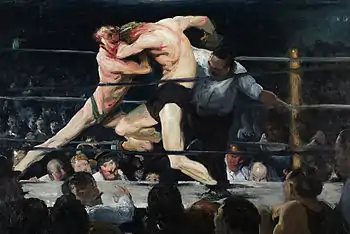Stag at Sharkey's
Stag at Sharkey's is a 1909[1] oil painting by George Wesley Bellows depicting two boxers fighting in the private athletic club situated across from his studio. It is part of the Ashcan School movement known in particular for depicting scenes of daily life in early twentieth century New York City, often in the city's poorer neighborhoods. Participants in the boxing ring were usually members of the club, but occasionally outsiders would fight with temporary memberships. These fighters were known as "stags".[2]
| Stag at Sharkey's | |
|---|---|
 | |
| Artist | George Wesley Bellows |
| Year | 1909 |
| Medium | oil on canvas |
| Dimensions | 92 cm × 122.6 cm (36.25 in × 48.25 in) |
| Location | Cleveland Museum of Art, Cleveland |
Description
Bellows used quick strokes to create a blurred image, simulating the two fighters in motion. He also chose a low point of view to put the viewer among the crowd watching the fight. He chooses "expressive involvement" in the action.[3] He said: "I don't know anything about boxing, I'm just painting two men trying to kill each other."[4]
History
He painted the work in August 1909, as a part of a boxing series.[5] The painting has been a part of the Cleveland Museum of Art's permanent collection since 1922.[1] He also created a lithograph of the scene, in 1917.[6]
References
- "Stag at Sharkey's". Cleveland Museum of Art. Retrieved 2014-07-09.
- "Sister Wendy's American Collection". PBS. Retrieved 2014-07-09.
- Morris, Daniel (2002). Remarkable Modernisms: Contemporary American Authors on Modern Art. Univ of Massachusetts Press. p. 148. ISBN 978-1-55849-324-7.
- Art, Samuel Dorsky Museum of (2001-09-23). With My Profound Reverence for the Victims: George Bellows. SUNY Press. ISBN 978-1-4384-3118-5.
- Doezema, Marianne (1992). George Bellows and Urban America. Yale University Press. p. 97. ISBN 978-0-300-05043-1.
- Art, Amon Carter Museum of Western; Junker, Patricia A.; McCandless, Barbara; Gillham, Will; Myers, Jane; Stewart, Rick; Rohrbach, John (2001). An American Collection: Works from the Amon Carter Museum. Hudson Hills. ISBN 978-1-55595-198-6.